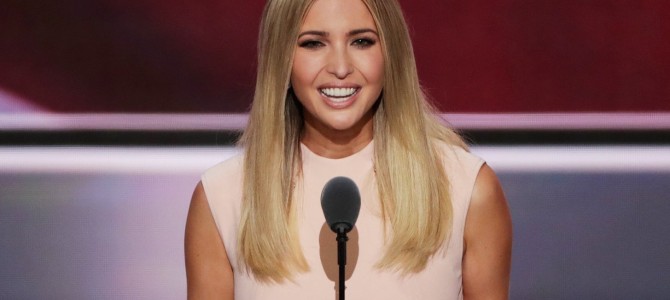
As voters count down the weeks to election day, it looks like Donald Trump’s chances for a come-from-behind victory are vanishingly slim. Several new polls this week showed Hillary Clinton surging despite her ongoing (and worsening) email scandal. A Monmouth University poll has Clinton ahead by 12 points, while polls from CBS and George Washington University put her 9 and 8 points ahead of Trump, respectively.
Assuming Trump loses in November, let’s think for minute about what might come after him. Who might best replace him as an outlet for populist angst? Because this is 2016, we can now take seriously ideas that last year seemed absurd. In that spirit, let me suggest that the most likely successor to Trump isn’t Chris Christie or Mike Pence or any other hapless politician. It’s Ivanka Trump.
By way of analogy, think of Ivanka as America’s Marine Le Pen, the current leader of France’s right-wing National Front party, which polls now show has a plurality of support with just six months to go before France’s presidential election. Le Pen is the daughter of Jean-Marie Le Pen, who founded the National Front in 1972 and made it to the final round of the 2002 presidential election. Under the elder Le Pen, who is now 88, the party was far more xenophobic and frankly anti-Semitic (Le Pen routinely minimized the Holocaust), and last year Marine Le Pen succeeded in officially ousting her father from the party.
Since taking over, Le Pen, 48, has worked to soften the National Front’s message and rhetoric, emphasizing the need to break from the European Union, pass immigration reform, and oppose the forces of international finance and globalism. As the National Front has moderated, it has increased its appeal—especially as France, like all of Europe, has continued to face an ongoing migrant crisis for which the EU appears to have no solutions.
Just as Marine Le Pen softened the hardline nationalism of her father, so too might Ivanka, 34, one day emerge as a softer, more appealing version of her loudmouth father. Although she’s not a politician and has never run for office, the idea isn’t as far-fetched as it might sound. Back in July, rumors swirled in the press that Donald might pick his daughter to be his running mate. The idea was endorsed by Sen. Bob Corker, who, when he withdrew his name from consideration for VP pick, told CNN Ivanka would be “his best running mate.”
America Isn’t France, But It’s Getting There
Plenty of parallels have been drawn between the growing nationalist, right-wing political movements in Europe and the rise of Trump’s unique mix of populist rhetoric and “America first” nationalism. Last December, John Cassidy of The New Yorker even argued that Donald Trump is “America’s Marine Le Pen,” because “his message is uncannily similar to Le Pen’s,” especially in the way both candidates link immigration and terrorism.
In the wake of the Paris terrorist attacks last November, a defiant Marine Le Pen said: “Islamist fundamentalism must be annihilated. France must ban Islamist organizations, close radical mosques, and expel foreigners who preach hatred in our country as well as illegal migrants who have nothing to do here.”
It’s easy to see the connection between this sort of rhetoric and Trump’s call for a Muslim ban. Although the parallels between Europe and America only go so far, on issues like immigration and trade—or at least the rhetoric employed to discuss immigration and trade—there are striking similarities between Trump and Le Pen. Cassidy was indeed onto something by making the comparison. He just had the wrong Trump.
Of course, some will object that Ivanka is far too liberal to be America’s Marine Le Pen. Indeed, her speech at the Republican National Convention in July could have been delivered at the Democrats’ convention in any other election year to rousing applause. She repeated the canard about unequal pay for women and trotted out the old liberal notion that government should make “quality childcare affordable and accessible for all”—which sounds nice until you recall that Democrats said the same thing about health care when they were trying to convince us of the wisdom of Obamacare. Even the Washington Post noticed the disconnect between the substance of her speech and the GOP crowd that ate it up.
To be sure, Ivanka isn’t what you would call conservative. But of course neither is her father. And although she might seem more liberal than he is on some policy issues, there’s no reason to believe he has any more of an aversion to big government welfare programs than she does, or even Hillary Clinton. If he does, he hasn’t said so yet. In fact, he’s promised not to reform the biggest welfare schemes of them all: Medicare and Social Security.
Trump has evinced such little knowledge of or interest in actual policy, the criticism that Ivanka would be more liberal, more like a Democrat from the 1990s, just as equally applies to him.
At this point in the election cycle, it’s clear that Ivanka is far more likeable than her father. She’s also smarter, and has political skills that he lacks. She’s been intimately involved in his campaign since the beginning, and maybe, just maybe, when the smoke clears on November 9, she’ll realize that, like Marine Le Pen, she could do this politics thing a lot better than her belligerent dad.









